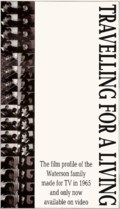> The Watersons > Records > Travelling for a Living
The Watersons: Travelling for a Living
 |
Travelling for a Living BBC TV documentary (UK, 1965), first shown on BBC 2 on 15 May 1966 |
This is a 1965 BBC TV documentary about the Watersons’ life and music. You can watch it at the British Film Institute.
Script and direction: Derrick Knight;
Camera: Ian McMillan;
Editing: Peter Neal;
Sound: Bob Allen;
Produced in 1965 by Derrick Knight and Partners
Musicians
The Watersons: siblings Mike, Norma, and Lal (Elaine) Waterson,
and their second cousin John Harrison;
Short guest appearances by Anne Briggs and Louis Killen
Tracks
- The Jolly Waggoners (Roud 1088)
- The Bonny Ship the “Diamond” (Roud 2172; G/D 1:11)
- Three Score and Ten (Roud 16873; TYG 5)
- The Thirty-Foot Trailer [Ewan MacColl]
- Hal-an-Tow (Roud 1520)
- Jolly Old Hawk (Roud 1048)
- Dido Bendigo (Roud 584; TYG 76)
- The Greenland Whale Fishery
(Roud 347)
Mike Waterson and Louis Killen - The Barley and the Rye (Roud 23268)
- The North Country Maid (Roud 1367; G/D 5:1058)
Sleeve Notes
Four young people huddle in the cold and discomfort of an old van as they travel, maybe hundreds of miles, to a singing engagement in a folk club, and back again to their home town of Hull. They are a group called the Watersons - Michael, Norma and Elaine Waterson, brother and two sisters, and their cousin John Harrison.
The three Watersons were orphaned in early life and brought up by a fiercely matriarchal grandmother who said they had to stick together. Even today the closeness of the family unit is maintained.
Despite the fact that two of them have married, they all live together in a single, scruffy terrace house, whose centre is a common kitchen, always full of friends and noise. This close, cosy home life is in total contrast to their professional life. In the last two years the Watersons have become one of the most popular folk singing groups in the country, yet they are far removed from the fashionable exhibitionist folk singers.
This film is about the Watersons’ world. It is about their lives - down to earth, vibrant, receptive, and haunted by all kind of influences from the past: their Irish tinker and farming ancestry, their grandmother’s second-hand shop where a love of tradition grew up among horse brasses and sing-songs, the rich historical and trading association of the port of Hull. Above all it is about exciting old music, its source and its meaning today. In this film, the Watersons are played against the broader picture of the folk revival.
Derrick Knight, 1966

